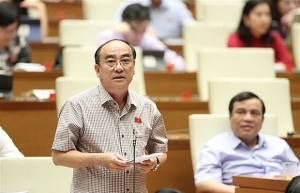Investment law revisions to increase decentralisation
 |
| Investment law revisions to increase decentralisation |
The Ministry of Planning and Investment (MPI) is preparing draft amendments to laws on planning, investment, public-private partnerships (PPP) investment, and bidding. The draft amendments are currently open for feedback and proposals from the business community before being submitted to the National Assembly (NA) for consideration.
During a seminar held last week in Ho Chi Minh City, which gathered opinions from provinces and cities in the Southeast and Mekong Delta regions, Deputy Minister of Planning and Investment Nguyen Thi Bich Ngoc said that the process of implementing relevant policies had exposed various inadequacies, creating challenges for businesses.
“The MPI has reviewed and submitted to the government a proposal to amend and supplement several articles of these laws to address implementation issues,” Ngoc said. “The revisions aim to remove obstacles in planning, investment, production, and business activities, ultimately promoting economic growth.”
Key changes include decentralising the approval of funding policies to provincial people’s committees, establishing investment support funds, and revising regulations for terminating ventures. In addition, special procedures will be introduced for projects in sectors deemed a priority for funding attraction.
The Law on Planning will be revised to strengthen the national planning system, while avoiding overlap between provincial and urban/rural planning. The amendments will also promote decentralisation and simplify processes.
To encourage public-private collaboration, the PPP law will also be amended, expanding the scope of sectors, forms, and methods for implementing related projects. It will also refine the financial mechanisms for such schemes. The MPI has proposed simplifying procedures, enhancing decentralisation of state management for PPP projects, and addressing challenges faced by transitional build-operate-transfer and build-transfer initiatives.
For the Law on Bidding, the MPI has suggested streamlining regulations to save time and accelerate the implementation of bidding packages. Additionally, the draft proposes adding new categories that allow for contractor selection in special cases, and decentralising authority to expedite implementation.
Localities have expressed broad support for the policy of separating site clearance compensation in public investment projects into independent ones, as a way to accelerate progress. The draft outlines situations where compensation, support, resettlement, and site clearance can be separated into independent projects, particularly for important national ones considered by the NA. For some smaller initiatives, decisions will be made by relevant authorities.
Nguyen Truc Son, Vice Chairman of Ben Tre People’s Committee, praised the innovative approach and openness in the draft revisions to the investment law.
“Allowing the separation of compensation, site clearance, and resettlement is a reasonable move, removing obstacles for localities during implementation. Priority should be given to small-scale Group A, B, and C projects, with flexibility depending on the situation,” Son said.
Le Hoang Anh, a standing member of the NA’s Finance and Budget Committee, emphasised the importance of timely development of the revised laws while ensuring their quality when submitted for approval at the upcoming session in October.
“We have encountered problems with the slow disbursement of official development assistance and domestic capital. Each phase of a project often involves multiple laws. Therefore, I hope that the MPI and localities will thoroughly review all challenges and overlaps when drafting them to ensure synchronised solutions,” Anh said.
Anh also highlighted the importance of carefully considering technical and policy solutions when developing regulations related to separating compensation for site clearance, to avoid unintended consequences.
| Nguyen Van Hoa, vice Chairman Hau Giang People’s Committee The draft regulations in the revised Law on Public Investment have removed many bottlenecks in the disbursement of public capital in localities in recent times. Separating compensation and site clearance to independent projects is appropriate and agreed by local authorities. The progress of public projects is fast or slow, depending on the site clearance stage. We need to work separately to accelerate implementation. We also need to propose decentralisation at all levels and separation of project components, creating conditions to accelerate progress. The progress of public investment disbursement depends largely on the site clearance work. Funds allocated by the government to localities are decentralised directly to people’s committees, without going through the local people’s council, which wastes more time. Le Ngoc Linh, director Ba Ria-Vung Tau Department of Planning and Investment Separating site clearance into separate projects as proposed in the draft revised law will solve the problem of ventures having to wait for land and ensure progress. However, this separation is associated with regulations on total investment of group A-C projects. Currently, the total funding includes the cost for site clearance. So how can we calculate the compensation cost alone? Because of the current reality, many projects have low construction and equipment costs but burdening very high site clearance costs. It is necessary to stipulate in the revised law that the amount of land clearance fees can be separated into a separate project, then local authorities can implement this regulation. Tran Thanh Chuong, deputy director general Yen Bai Department of Planning and Investment The Law on Investment 2020 does not mention projects that are not subject to funding policy approval. So it is necessary to supplement this case and specify the related regulations. Regarding the financial capacity of investors, the current law does not stipulate their minimum equity ratio. To ensure the mobilisation of resources for ventures, I recommend supplementing specific provisions on the minimum equity ratio as a basis for assessing the financial capacity of investors. According to Clause 1 in Article 33 of the Law on Investment, the documents proving the financial capacity of investors are the latest financial report, the parent company’s financial support commitment, the financial support commitment of financial institutions, financial guarantees, and other documents. It is necessary to specify “other documents” with criterion for enterprises to understand and follow. In reality, there are some cases in which the investor’s equity is too small compared to the capital to implement the project, the rest is mobilised capital. This is quite risky and difficult for approval. Tran Quoc Viet, deputy director Nhan Dan Hanoi Printing Co., Ltd. We are not allowed to participate in the bidding package for printing publications that Nhan Dan newspaper is the investor of because it does not ensure competitiveness. Article 6 of the current Law on Bidding stipulates that the contractor must be legally and financially independent of the investors, except when the contractor is a public service unit under a state management agency with assigned tasks consistent with the bidding package of that agency; or is a member company or subsidiary of a state-owned corporation or one whose main business lines are also consistent with that corporation. Therefore, power transmission companies and power construction companies under Vietnam Electricity, with similar professional functions and tasks, can participate in the bidding packages. This provision in the current Law on Bidding is only suitable for corporations and groups, while printing companies under other newspapers are also struggling with this provision. |
 | Further clarity to new investment laws International investors are seeking for more positive changes in mergers and acquisitions transactions and market access conditions in the latest draft amendments to the Law on Investment to keep them moving forward with their future ventures. |
 | NA passes revised investment law The National Assembly (NA) passed the Law on Investment (revised) in the afternoon of June 17, with 92.34 percent of deputies voting in favour. |
 | Amended investment law to relieve funding burdens With the strategic plan to attract qualified foreign investment into Vietnam in the light of the Politburo’s Resolution No.50-NQ/TW, the drafted amendment of the Law on Investment 2014 simplifies licensing procedures for setting up a foreign-invested entity. Nguyen Hung Quang, and Le Gia Khanh, lawyers at law firm NHQuang&Associates, write about the impacts on overseas investors in the country. |
 | Crafting complete enterprise and investment laws The Law on Investment (LoI) and the Law on Enterprises (LoE), both issued in 2020, are the essential legal references for foreign investment in Vietnam. Both have marked an important milestone in development of the Vietnamese legal framework on foreign direct investment (FDI), creating more favourable conditions for foreign investors when implementing investment projects in Vietnam. |
What the stars mean:
★ Poor ★ ★ Promising ★★★ Good ★★★★ Very good ★★★★★ Exceptional
Related Contents
Latest News
More News
- Internal strengths attest to commitment to progress (February 19, 2026 | 20:13)
- Vietnam, New Zealand seek level-up in ties (February 19, 2026 | 18:06)
- Untapped potential in relations with Indonesia (February 19, 2026 | 17:56)
- German strengths match Vietnamese aspirations (February 19, 2026 | 17:40)
- Kim Long Motor and AOJ Suzhou enter strategic partnership (February 16, 2026 | 13:27)
- Haiphong welcomes long-term Euro investment (February 16, 2026 | 11:31)
- VIFC in Ho Chi Minh City officially launches (February 12, 2026 | 09:00)
- Norfund invests $4 million in Vietnam plastics recycling (February 11, 2026 | 11:51)
- Marico buys 75 per cent of Vietnam skincare startup Skinetiq (February 10, 2026 | 14:44)
- SCIC general director meets with Oman Investment Authority (February 10, 2026 | 14:14)

 Tag:
Tag:


















 Mobile Version
Mobile Version